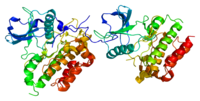
Photo from wikipedia
Despite the extensive body of research, understanding the exact molecular mechanisms governing inflammatory bowel diseases (IBDs) still demands further investigation. Transforming growth factor-β1 (TGF-β1) signaling possesses a multifacial effect on… Click to show full abstract
Despite the extensive body of research, understanding the exact molecular mechanisms governing inflammatory bowel diseases (IBDs) still demands further investigation. Transforming growth factor-β1 (TGF-β1) signaling possesses a multifacial effect on a broad range of context-dependent cellular responses. However, long-term TGF-β1 activity may trigger epithelial-mesenchymal transition (EMT), followed by fibrosis. This study aimed to determine the role of epithelial TGF-β1 signaling in inflammatory bowel disease (IBD) pathogenesis. The expression of TGF-β1 signaling components and EMT-related and epithelial tight junction markers was examined in IBD patients (n = 60) as well as LPS-induced Caco-2/RAW264.7 co-culture model using quantitative real-time polymerase chain reaction (qRT-PCR), Western blotting, and immunofluorescence staining. Furthermore, the effect of A83-01, as a TGF-β receptor I (TβRI) inhibitor, on the inflamed epithelial cells was evaluated in vitro. To evaluate the cytotoxic effects of the TβRI inhibitor, a cell viability assay was performed by the MTS method. Considering the activation of canonical and non-canonical TGF-β1 signaling pathways in IBD patients, expression results indicated that administering A83-01 in inflamed Caco-2 cells substantially blocked the expression level of TGF-β1, SMAD4, and PI3K and the phosphorylation of p-SMAD2/3, p-AKT, and p-RPS6 as well as prevented downregulation of LncGAS5 and LncCDKN2B. Further analysis revealed that the inhibition of TGF-β1 signaling in inflamed epithelial cells by the small molecule could suppress the EMT-related markers as well as improve the expression of epithelial adherens and tight junctions. Collectively, these findings indicated that the inhibition of the TGF-β1 signaling could suppress the induction of EMT in inflamed epithelial cells as well as exert a protective effect on preserving tight junction integrity. There is a pressing need to determine the exact cellular mechanisms by which TGF-β1 exerts its effect on IBD pathogenesis.
Journal Title: Experimental biology and medicine
Year Published: 2023
Link to full text (if available)
Share on Social Media: Sign Up to like & get
recommendations!